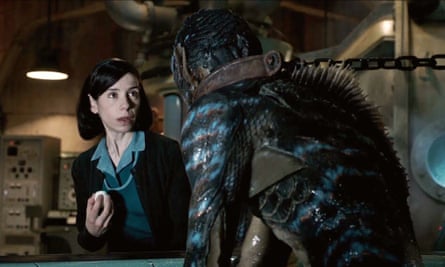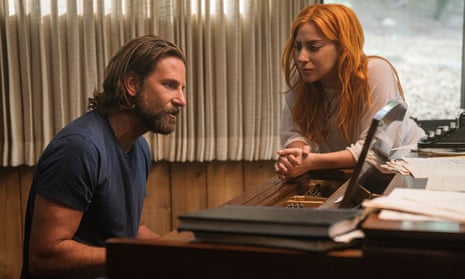For most of the Venice film festival’s 75 years, its interests have intersected only occasionally with those of the Academy Awards. Even when they have, no one’s made much of a circus about it: in 2008, future best picture winner The Hurt Locker premiered on the Lido to strong reviews, but so muted was the industry reception that its release was deferred until the next year. The next year, I attended my first Venice as a critic: awards prognosticators had only Tom Ford’s A Single Man to nibble at, while the rest of us feasted on new works by Claire Denis, Jessica Hausner and Jaco Van Dormael. The Venice film festival is part of the Biennale, after all: art is the operative word.
Fast-forward to 2018 and the picture is slightly different. Under the new stewardship of director Alberto Barbera, Venice has been branded an Oscar kingmaker: it’s the festival where such films as Gravity, Black Swan, Birdman, Spotlight and La La Land all kicked off their golden awards-season trajectories, rather than handing “we saw it first” bragging rights to Telluride or Toronto. Last year, Guillermo del Toro’s lavish fantasy The Shape of Water became the first winner of the Venice Golden Lion to scoop the best picture Oscar; this year’s wildly popular Golden Lion champ, Alfonso Cuarón’s exquisite memory piece Roma, has designs on becoming the second.

Roma wasn’t the only high-end awards hopeful this year at a Venice that positively teemed with English-language prestige fare: it opened with Damien Chazelle’s space-race epic First Man and reached glittery fever pitch with the premiere of Bradley Cooper’s A Star Is Born, currently seen as the clear frontrunner in the Oscar race. Yorgos Lanthimos’s The Favourite debuted there to immediate awards chatter; so high was the Oscar buzz quotient that a new Coen brothers film, The Ballad of Buster Scruggs, lasted just a couple of hours in the conversation cycle once it was deemed to have little awards potential.
Venice and its visiting press could hardly be more delighted with this turn of events, but its surging profile has left other festival directors feeling a bit miffed. Most vocal among them is Thierry Frémaux, who heads up Venice’s august rival Cannes: “I don’t understand this obsession with American movies,” the Frenchman said of Barbera’s programming approach this week. “My friend Barbera didn’t have [Hirokazu] Kore-eda’s film, nor Korean, Egyptian or Lebanese movies in competition. I think a festival must show the cinema of the whole world.”

The industry was quick to call out Frémaux’s comments as sour grapes: after all, it is now known that Cannes made a play for A Star Is Born before Warner Bros opted, like many Oscar-minded studios, for the shorter, more sustained publicity window that comes by premiering in the autumn rather than the spring. Meanwhile, Roma is one of several Netflix-backed titles – including Paul Greengrass’s 22 July and the Orson Welles curio The Other Side of the Wind – that were slated to play at Cannes before a much-publicised impasse on distribution policy between the streaming giant and French exhibitors led to Netflix withdrawing from the festival entirely.
“Venice plays its game and they’re right to screen Netflix movies if Cannes doesn’t take them,” Frémaux said, rather sniffily. “They’re also right to play the Oscar card because the press is more obsessed with one night in March than with the six months from July to October.”
Dubious month-counting skills notwithstanding, Frémaux’s statement isn’t entirely off the mark: mainstream press outlets increasingly treat even European festivals as awards-season launchpads first and foremost, disregarding a wide swath of exceptional foreign art films because they don’t fit the remit. Many US outlets in particular dismissed this year’s Gaga-free, Netflix-boycotted Cannes lineup as the festival’s worst in years, when it turned out to be a lively and surprising programme of world cinema: low on premium Hollywood material, yes, but particularly rich in Asian titles, which yielded a widely beloved Palme d’Or winner in Kore-eda’s Shoplifters. The undeniable dazzle of Venice’s programme, however, came at the expense of some diversity: over half the competition lineup, 12 of 21 titles, was English-language. (That doesn’t include Roma, a foreign film from a director with Hollywood A-list credentials.) That premier section included one film from Asia, zero from Africa and only one female director: the sidebar selections were considerably more mixed, but these are not encouraging stats for anyone who attends Venice looking for alternatives to the noise.

But it’s disingenuous of Frémaux to speak as if his programming team expressly turned down Venice’s prize ponies, as opposed to making the best of their absence. Likewise, to accuse Venice of a US “obsession” when Cannes has a long history of courting Hollywood blockbusters – up to and including this year’s dubious Solo: A Star Wars Story – to brighten up the Croisette doesn’t really wash. (Hell, Cannes even gave Basic Instinct a competition berth way back in 1992.) Venice “plays its game”, certainly, but so does every savvy festival director in the business – Frémaux included.
If the atmosphere and remit of these major European festivals has shifted in the last decade or so, it’s because the Oscars have shifted too. Once dominated by the kind of major studio pictures that had no need of a festival launch to cultivate audience and Academy awareness, they’ve turned radically in favour of independent cinema, as studios have largely abandoned upscale adult drama to focus on popcorn franchises of frequently modest artistic merit. (Hence the ludicrous, and swiftly shelved, talk of a best popular film Oscar earlier this year.) It was once rare for a best picture winner to be festival-minted; now, you have to go back to 2006’s The Departed to find a film that landed the Academy’s top prize without that early platform.
Gatekeepers such as Barbera and Frémaux are figuring out how to balance this growing area of comparatively mainstream interest with the more challenging international auteur fare that has long been their artisanal bread and butter. It’s not as if Venice has turned its back on the latter: Lucrecia Martel’s Zama and László Nemes’s Sunset are two recent titles that Venice plucked from Cannes’s reject pile. Squabbling over the spoils flatters no one: that Cannes and Venice both produced rewarding programmes of very different stripes this year proves there’s still enough cinema to go round.

Comments (…)
Sign in or create your Guardian account to join the discussion